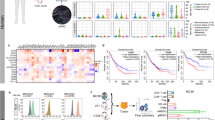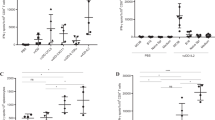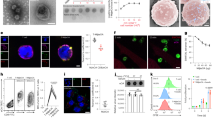Abstract
Interleukin (IL)-28A/interferon (IFN)-λ2 and IL-29/IFN-λ1 have been demonstrated to elicit direct and indirect anti-tumor actions. In this study, we constructed an adenovirus vector expressing either IL-28A/IFN-λ2 (AdIL-28A) or IL-29/IFN-λ1 (AdIL-29) to evaluate the therapeutic properties of intratumoral injection of recombinant adenovirus to apply for the clinical implementation of cancer gene therapy. Despite the lack of an anti-proliferative effect on MCA205 and B16-F10 cells, a retarded growth of established subcutaneous tumors was observed following multiple injections of either AdIL-28A or AdIL-29 when compared with AdNull. In vivo cell depletion experiments displayed that both NK cells and CD8+ T cells have a major role in AdIL-28A-mediated tumor growth suppression. A significant increase in the number of infiltrating CD8+ T cells into the tumors treated with either AdIL-28A or AdIL-29 was observed. Moreover, specific anti-tumor cytotoxic T lymphocyte reactivity was detected in spleen cells from animals treated with either AdIL-28A or AdIL-29. In IFN-γ-deficient mice, anti-tumor activities of AdIL-28A were completely impaired, indicating that IFN-γ is critically involved in the tumor growth inhibition triggered by AdIL-28A. IL-12 provided a synergistic anti-tumor effect when combined with AdIL-28A. These results indicate that AdIL-28A and AdIL-29 could be successfully utilized as an alternative cancer immunogene therapy.
This is a preview of subscription content, access via your institution
Access options
Subscribe to this journal
Receive 12 print issues and online access
$259.00 per year
only $21.58 per issue
Buy this article
- Purchase on Springer Link
- Instant access to full article PDF
Prices may be subject to local taxes which are calculated during checkout








Similar content being viewed by others
References
Kotenko SV, Gallagher G, Baurin VV, Lewis-Antes A, Shen M, Shah NK et al. IFN-λs mediate antiviral protection through a distinct class II cytokine receptor complex. Nat Immunol 2003; 4: 69–77.
Sheppard P, Kindsvogel W, Xu W, Henderson K, Schlutsmeyer S, Whitmore TE et al. IL-28, IL-29 and their class II cytokine receptor IL-28R. Nat Immunol 2003; 4: 63–68.
Prokunina-Olsson L, Muchmore B, Tang W, Pfeiffer RM, Park H, Dickensheets H et al. A variant upstream of IFNL3 (IL28B) creating a new interferon gene IFNL4 is associated with impaired clearance of hepatitis C virus. Nat Genet 2013; 45: 164–171.
Pestka S, Krause CD, Walter MR . Interferons, interferon-like cytokines, and their receptors. Immunol Rev 2004; 202: 8–32.
Zhou Z, Hamming OJ, Ank N, Paludan SR, Nielsen AL, Hartmann R . Type III interferon (IFN) induces a type I IFN-like response in a restricted subset of cells through signaling pathways involving both the Jak-STAT pathway and the mitogen-activated protein kinases. J Virol 2007; 81: 7749–7758.
Fujie H, Tanaka T, Tagawa M, Kaijun N, Watanabe M, Suzuki T et al. Antitumor activity of type III interferon alone or in combination with type I interferon against human non-small cell lung cancer. Cancer Sci 2011; 102: 1977–1990.
Numasaki M, Tagawa M, Iwata F, Suzuki T, Nakamura A, Okada M et al. IL-28 elicits antitumor responses against murine fibrosarcoma. J Immunol 2007; 178: 5086–5098.
Li Q, Kawamura K, Ma G, Iwata F, Numasaki M, Suzuki N et al. Interferon-lambda induces G1 phase arrest or apoptosis in oesophageal carcinoma cells and produces anti-tumour effects in combination with anti-cancer agents. Eur J Cancer 2010; 46: 180–190.
Li Q, Kawamura K, Okamoto S, Fujie H, Numasaki M, Namba M et al. Adenoviruses-mediated transduction of human oesophageal carcinoma cells with the interferon-λ genes produced anti-tumour effects. Br J Cancer 2011; 105: 1302–1312.
Sato A, Ohtsuki M, Hata M, Kobayashi E, Murakami T . Antitumor activity of IFN-lambda in murine tumor models. J Immunol 2006; 176: 7686–7694.
Lasfar A, Lewis-Antes A, Smirnov SV, Anantha S, Abushahba W, Tian B et al. Characterization of the mouse IFN-lambda ligand-receptor system: IFN-lambdas exhibit antitumor activity against B16 melanoma. Cancer Res 2006; 66: 4468–4477.
Abushahba W, Balan M, Castaneda I, Yuan Y, Reuhl K, Raveche E et al. Antitumor activity of type I and type III interferons in BNL hepatoma model. Cancer Immunol Immunother 2010; 59: 1059–1071.
Tezuka Y, Endo S, Matsui A, Sato A, Saito K, Semba K et al. Potential anti-tumor effect of IFN-λ2 (IL-28A) against human lung cancer cells. Lung Cancer 2012; 78: 185–192.
Numasaki M, Fukushi J, Ono M, Narula SK, Zavodny PJ, Kudo T et al. Interleukin-17 promotes angiogenesis and tumor growth. Blood 2003; 101: 2620–2627.
Dumoutier L, Tounsi A, Michiels T, Sommereyns C, Kotenko SV, Renauld JC . Role of the interleukin (IL)-28 receptor tyrosine residues for antiviral and antiproliferative activity of IL-29/interferon-λ1: similarities with type I interferon signaling. J Biol Chem 2004; 279: 32269–32274.
Segal JG, Lee NC, Tsung YL, Norton JA, Tsung K . The role of IFN-γ in rejection of established tumors by IL-12: source of production and target. Cancer Res 2002; 62: 4696–4703.
Rosenthal FM, Cronin K, Bannerji R, Golde DW, Gansbacher B . Augmentation of antitumor immunity by tumor cells transduced with a retroviral vector carrying the interleukin-2 and interferon-γ cDNAs. Blood 1994; 83: 1289–1298.
Brand S, Beigel F, Olszak T, Zitzmann K, Eichhorst ST, Otte JM et al. IL-28A and IL-29 mediate antiproliferative and antiviral signals in intestinal epithelial cells and murine CMV infection increases colonic IL-28A expression. Am J Physiol 2005; 289: G960–G968.
Meager A, Visvalingam K, Dilger P, Bryan D, Wadhwa M . Biological activity of interleukins-28 and -29: comparison with type I interferons. Cytokine 2005; 31: 109–118.
Yan Y, Zhang J, Liu Y, Zhu T, Yuan L, Ge Y et al. Inhibition of lung adenocarcinoma transfected with interleukin 28A recombinant adenovirus (Ad-mIFN-λ2) in vivo. Cancer Biother Radiopharm 2013; 28: 124–130.
Souza-Fonseca-Guimaraes F, Young A, Mittal D, Martinet L, Bruedigam C, Takeda K et al. NK cells require IL-28R for optimal in vivo activity. Proc Natl Acad Sci USA 2015; 112: E2376–E2384.
Hung K, Hayashi R, Lafond-Walker A, Lowenstein C, Pardoll D, Levitsky H . The central role of CD4+ T cells in the antitumor immune response. J Exp Med 1998; 188: 2357–2368.
Segal BM, Glass DD, Shevach EM . IL-10-producing CD4+ T cells mediate tumor rejection. J Immunol 2002; 168: 1–4.
Clarke SR . The critical role of CD40/CD40L in the CD4-dependent generation of CD8+ T cell immunity. J Leukocyte Biol 2000; 67: 607–614.
Sutmuller RP, van Duivenvoorde LM, van Elsas A, Schumacher TN, Wildenberg ME, Allison JP et al. Synergism of cytotoxic T lymphocyte-associated antigen 4 blockade and depletion of CD25+ regulatory T cells in antitumor therapy reveals alternative pathways for suppression of autoreactive cytotoxic T lymphocyte responses. J Exp Med 2001; 194: 823–832.
Smyth MJ, Teng MW, Swann J, Kyparissoudis K, Godfrey DI, Hayakawa Y . CD4+CD25+ T regulatory cells suppress NK cell-mediated immunotherapy of cancer. J Immunol 2006; 176: 1582–1587.
Mennechet FJ, Uzé G . Interferon-lambda-treated dendritic cells specifically induce proliferation of FOXP3-expressing suppressor T cells. Blood 2006; 107: 4417–4423.
Nakajima C, Uekusa Y, Iwasaki M, Yamaguchi N, Mukai T, Gao P et al. A role of interferon-gamma (IFN-gamma) in tumor immunity: T cells with the capacity to reject tumor cells are generated but fail to migrate to tumor sites in IFN-gamma-deficient mice. Cancer Res 2001; 61: 3399–3405.
Kobayashi M, Fitz L, Ryan M, Hewick RM, Clark SC, Chan S et al. Identification and purification of natural killer cell stimulatory factors (NKSF), a cytokine with multiple biological effects on human lymphocytes. J Exp Med 1989; 170: 827–845.
Robertson MJ, Soiffer RJ, Wolf SF, Manley TJ, Donahue C, Young D et al. Responses of human natural killer (NK) cells to NK cell stimulatory factor (NKSF): cytolytic activity and proliferation of NK cells are differentially regulated by NKSF. J Exp Med 1992; 175: 779–788.
Gately MK, Wolitzky AG, Quinn PM, Chizzonite R . Regulation of human cytolytic lymphocyte responses by interleukin-12. Cell Immunol 1992; 143: 127–142.
Manetti R, Parronchi P, Giudizi MG, Piccinni MP, Maggi E, Trinchieri G et al. Natural killer cell stimulatory factor (interleukin 12 [IL-12]) induces T helper type 1 (Th1)-specific immune response and inhibits the development of IL-4-producing Th cells. J Exp Med 1993; 177: 1199–1204.
Hiramoto JS, Tsung K, Bedolli M, Norton JA, Hirose R . Antitumor immunity induced by dendritic cell-based vaccination is dependent on interferon-gamma and interleukin-12. J Surg Res 2004; 116: 64–69.
Acknowledgements
We thank Mr Kazunori Kato, Dr Jun Kobayashi and Dr Keizo Kasono for their excellent technical assistance and useful discussions in carrying out this study. Dr Ohrui was partly supported by a Grant-in-Aid for Scientific Research from the Ministry of Education, Science, Culture, Sports, Science and Technology (26460900).
Author information
Authors and Affiliations
Corresponding author
Ethics declarations
Competing interests
The authors declare no conflict of interest.
Additional information
Supplementary Information accompanies the paper on Cancer Gene Therapy website
Supplementary information
Rights and permissions
About this article
Cite this article
Hasegawa, K., Tagawa, M., Takagi, K. et al. Anti-tumor immunity elicited by direct intratumoral administration of a recombinant adenovirus expressing either IL-28A/IFN-λ2 or IL-29/IFN-λ1. Cancer Gene Ther 23, 266–277 (2016). https://doi.org/10.1038/cgt.2016.29
Received:
Revised:
Accepted:
Published:
Issue Date:
DOI: https://doi.org/10.1038/cgt.2016.29
This article is cited by
-
Interleukins in cancer: from biology to therapy
Nature Reviews Cancer (2021)



